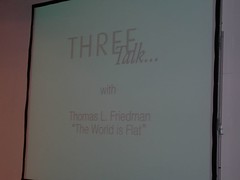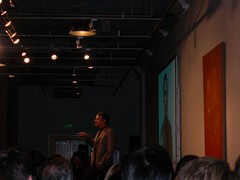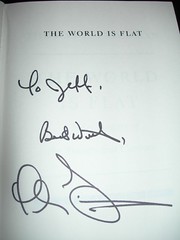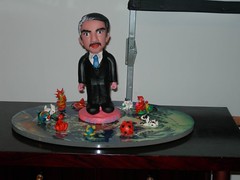
Thomas Friedman in Shanghai
 I’ve just gotten back from a talk and book signing with Thomas Friedman. My Principal called me today and told me that Friedman was in town today giving a speech on his book and a book signing. Bless my wife, for as soon as I got the call she knew the rest of our day’s plans where out the window. You can’t help but love a spouse that understands you. I wasn’t going to go, but she looked at me and told me I needed to….after all it is this book that I read while here in Shanghai that has pushed me in everything I’ve done the past year. From this blog, to how I support teachers on using technology. The talk was very much along the same lines as the one he gave at MIT going over the start of the book and the 10 Flatteners. He did say he is working on another version of the book version 3.0 he called it, as he has to continue to update the book as things change. Just another way to show how quickly printed books go out of date. Interesting really that a book can have multiple versions. Where something like Wikipedia is constantly changing and being added to in real time, a book has to go through reprints. Would it be better to have a “World is Flat” wiki. Where Friedman could charge ‘admission’ to the wiki and update it without going to the publisher every 6 months….an interesting thought.
I’ve just gotten back from a talk and book signing with Thomas Friedman. My Principal called me today and told me that Friedman was in town today giving a speech on his book and a book signing. Bless my wife, for as soon as I got the call she knew the rest of our day’s plans where out the window. You can’t help but love a spouse that understands you. I wasn’t going to go, but she looked at me and told me I needed to….after all it is this book that I read while here in Shanghai that has pushed me in everything I’ve done the past year. From this blog, to how I support teachers on using technology. The talk was very much along the same lines as the one he gave at MIT going over the start of the book and the 10 Flatteners. He did say he is working on another version of the book version 3.0 he called it, as he has to continue to update the book as things change. Just another way to show how quickly printed books go out of date. Interesting really that a book can have multiple versions. Where something like Wikipedia is constantly changing and being added to in real time, a book has to go through reprints. Would it be better to have a “World is Flat” wiki. Where Friedman could charge ‘admission’ to the wiki and update it without going to the publisher every 6 months….an interesting thought.
 The questions from the crowd were interesting as one person asked about education and “Flat Schools”. Hhhhmmmm, wonder where they got that notion from? Anyway, Friedman gave an interesting response. He said he still believes in the ‘old education’ that in this new flat word reading, writing, and arithmetic are still important. But that the best skill we can teach kids is to “Learn how to learn.” But how do we do that in an old school in an unflat school. Does a school need to be flat in order to teach and learn to learn? While I agree with Friedman on this point I don’t think that goes far enough. Learning how to learn is one thing. Learning to learn, unlearn, relearn, remix, mash up, unlearn, relearn, is something completely different. And that you can not do in a non flat school. He talked about his worry of Myspace, that anything you whisper could be put on a person’s myspace page. That neighbors could write things about you, about things you do in your own home, and once those things are written by others trying to change them could be difficult. So to teach students to be stewards of the web to understand that something you write whether it be about yourself or someone else is public to the world is another skill we need to be teaching.
The questions from the crowd were interesting as one person asked about education and “Flat Schools”. Hhhhmmmm, wonder where they got that notion from? Anyway, Friedman gave an interesting response. He said he still believes in the ‘old education’ that in this new flat word reading, writing, and arithmetic are still important. But that the best skill we can teach kids is to “Learn how to learn.” But how do we do that in an old school in an unflat school. Does a school need to be flat in order to teach and learn to learn? While I agree with Friedman on this point I don’t think that goes far enough. Learning how to learn is one thing. Learning to learn, unlearn, relearn, remix, mash up, unlearn, relearn, is something completely different. And that you can not do in a non flat school. He talked about his worry of Myspace, that anything you whisper could be put on a person’s myspace page. That neighbors could write things about you, about things you do in your own home, and once those things are written by others trying to change them could be difficult. So to teach students to be stewards of the web to understand that something you write whether it be about yourself or someone else is public to the world is another skill we need to be teaching.
 In a flat world the skills that you need are:
In a flat world the skills that you need are:
1. To be able to, and know how to, learn, unlearn, and relearn
2. To be able to navigate information not only successfully, but quickly and efficiently
3. To understand the connectedness of the world in which we live
4. To understand that your geographical location on earth (or in space for that matter) no longer matters.
5. That information and knowledge are living, changing, elements of our time.
The only way to teach the skills of a flat world, is to have a flat classroom. You can not teach these skills disconnected from the world in which these skills are needed. Friedman admitted that he talks about a flat connected world, but lives a very unconnected life.
My brain keeps going back to education, and whether we are willing to admitted to ourselves that education as changed. Google is more knowledgeable than any teacher, and Wikipedia is more up to date than any textbook. For some reason we think that students still have to come to school to learn, that it is only through professional teachers that knowledge, and learning can take place. Education needs to understand that it is not content that we offer our students any more, it’s the teaching of the skills to get to that content. Education was founded on skills, the ability to read, the ability to write, and the ability to do math are skills. Education needs to focus on these and add 21st Century Skills as well. The ability to find reliable information, the ability to synthesize data, and the ability to continuously learn. Content should no longer be our focus.
Who was the 24th President of the United States? This is content that if you are in America you learned at some point in your schooling. But does that content have relevance to you and does it really matter here and now? But, do you know how to find the answer to that question? If you are in Austrailia, or Canada, or any other country it has no relevance to you I’m pretty sure. But what matters is, if you needed to know that Grover Cleveland was the 24th President, do you know how to find it? Where would you go to find it, and how would you know that information was correct once you did find it?
That’s what education needs to be about, quit memorizing states and presidents and learn to learn for a reason. Have a reason to learn a president at a specific time, or learn about a specific state because there is something in the news. We waste a lot of time in America learning our 50 states and how many adults today in the U.S. could name all 50?
Learning to learn needs to be our focus, not learning to know. 
(Thomas Friedman’s gift, a cake of himself standing on a flat world surrounded by the 12 Chinese Zodiac signs.)







It’s a little too easy to say that all we need to do is teach skills. There is knowledge that needs to be in place to enable the learning of the skills to occur. The dilemma is what particular knowledge do we make available to children. Geography is as good an example as any. We cannot think effectively about human behavior until we understand the conditions under which different groups live. And without a working knowledge (i.e. something always present in our mind) of where things are (e.g. the fifty states), we can be thinking critically but without a proper context.
It is tempting to think that children can make their own decisions about what belongs in their working knowledge and it is certainly true that this increases with age. But a given group of people (e.g. a school, a family, a church) need to have something established for the process to get started.
The choice of what knowledge to start with is always driven by limited agendas (since humans are limited beings), so its important that we understand this “agenda process” so we can have self-correcting systems. (This is a 21st century skill.) Doing this well requires a lot of work on one’s self and then doing so with a group of people, such as two parents or a school faculty. It’s not easy.
Jeff, I think this is a great post…there are always details we can discuss but in terms of getting at the heart of the issue I believe you have stated the case very clearly. I am clipping this blog for my faculty.
I am not sure where eric is coming from but I do not believe you are advocating no structure or no basic contnet. I am currently at a Leadership Conference with Alan November and your post is a great summary of his presentation.